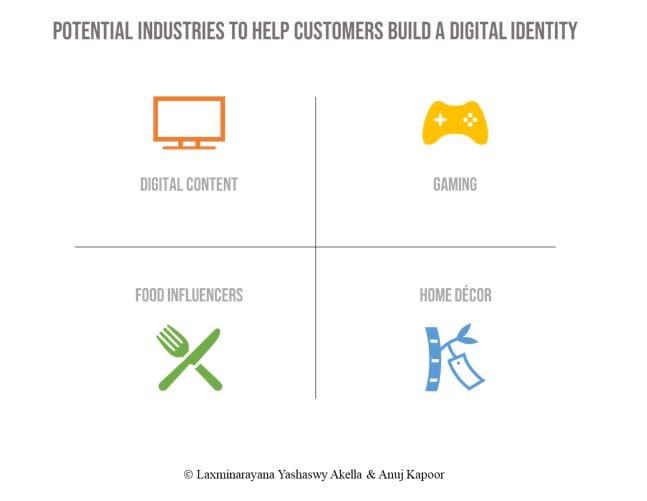
Covid-19 and the rise of digital identity
How different industries can help customers in building a digital identity, by reconsidering their existing business models and surviving the pandemic
 Image: Shutterstock
Image: ShutterstockThe COVID-19 pandemic has led to a drastic change in an individual’s lifestyle. As a response to contain COVID, most countries in the world imposed strict lockdowns to control the spread of the virus. As individuals are forced to stay home in a constrained environment with limited physical access to their immediate and distant social circles, their sense of identity is likely to be threatened and this in turn can lead to uneasiness (reactance) in them. According to research in psychology, reactance is the motivation to regain freedom after it has been lost or threatened, which leads people to resist the social influence of others. As a result, people are spending more time online via video calls to their colleagues, binge watching series or learning new skills. However, some of them are also spending time to build their digital identity – this is being done to compensate the loss of their physical presence. There are various routes that an individual can follow to instill their digital presence online. In this article, we discuss how different industries can help customers in building a digital identity, by reconsidering their existing business models and surviving the pandemic.
Digital content providers: Many companies have advised their employees to work from home. With renewals and subscriptions, a click away, people are subscribing to online streaming services to binge-watch shows. Streaming sites can make use of this behavior to release more content, work on providing better recommendations, and adjust the pricing. Pricing is an important issue because of rampant account swapping (that time when you used your friend's friend's Netflix account to watch a series). Due to this well-known issue, Netflix loses around 135 million USD every month. By promoting the feature of tailor-made recommendations to each individual account, the online content providing industry can be profitable.
Gaming Industry: During peak lockdown, when major sporting events such as Premier League, La Liga, and Indian Premier League have been called off, the sports websites saw a drastic fall in user visits. To compensate for this, fans have moved to websites such as Twitch, where they can watch people play eSports. As per a report by the World Economic Forum, the video game market in 2020 will be worth nearly $160 billion with almost half of that coming from mobile gaming. The revenue model for the gaming industry has been consumer spending and advertisement revenues. As per a report by Unity, the ad revenues from mobile gaming increased by 59% and ad impressions by 57%. The growth in gaming behavior implies that companies have to devote time to enhance user engagement of every player. The new gamers will be inclined to build their gaming profiles, stream them, and gain recognition without having to step outside their homes. Another strategy would be releasing old games for free. Grand Theft Auto gave away the premium version of their 2013 game, GTA 5 for free and saw an increase in downloads that led to their website crashing multiple times in May. Companies can release games for free to track user gaming behavior and build better games.
Food delivery services: Quick Service Restaurant chains have begun to adhere to social distancing norms and remodeled the layouts of their facilities. Takeout has become the new norm and home delivery apps such as Uber Eats will see a growth in sales through their platforms. Restaurants and other delivery apps together can identify customers who order from them frequently to write reviews about their hygiene standards in their kitchens. These customers will act as a bridge between the food chains and their new customers. In order to establish a digital presence, these apps can include influencer pages where people can visit and read about how the restaurants are managing with less staff and offering better quality food and services. Since physical travelling is restricted, these apps can identify local customers within a specific radius of the restaurant, and utilize them as local opinion leaders.
Home Decor Services: The most unexpected item on this list is home decor services. As happens with any new change in life: When work from home was a new phenomenon, it was fun for the first week but as time progressed, people became tired of sitting at the same place while trying to connect with each other over Zoom. Home decor services will be perfect for addressing all these issues. By this we do not mean to hire an expert but companies such as Amazon can come up with dedicated pages from artists to show people how to decorate their work spaces (at home). This will motivate individuals to display their tastes and preferences. The Ikea model to remodel people’s work spaces every fortnight can be useful here. It will also keep the users engaged in building their identity and will make work from home more productive.

In addition to the above trends, we also believe that customers will be inclined to explore beyond free services to have a greater control over things. We have come up with the term, “Digital Pampering” to describe this phenomenon. Since lockdowns have begun, people feel a sense of loss of control. The only acts they feel in control of are preventive ones such as maintaining social distancing, sanitizing their hands, and wearing masks. Such acts have taken over their minds. So, in order to feel more in control, people may be willing to spend additional money on the premium services available to pamper themselves. For example, LinkedIn Premium (for better control of their professional life), Food delivery premium Membership (for priority delivery slots, exclusive discounts, and cashbacks), Amazon Prime for quick delivery, and so on. Digital identity will be the most dominant norm in upcoming years. Till we realize that the pandemic has truly left us, we urge people to stay home, stay safe and wear masks.
About authors: Laxminarayana Yashaswy Akella is Doctoral Student, Marketing and Anuj Kapoor is Assistant Professor, Marketing at IIM Ahmedabad.







